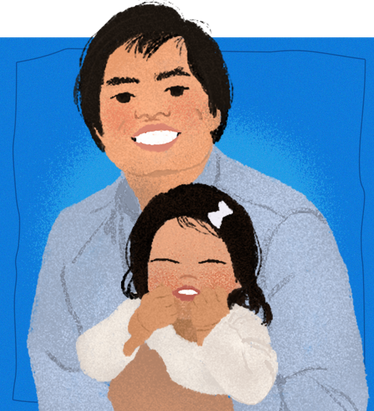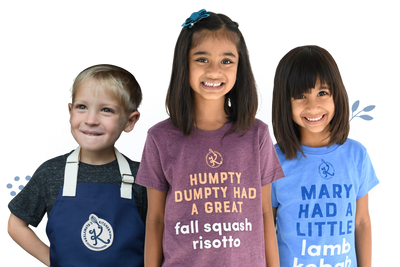
Taste Bud Profile
Ron Hsu

Chef Ron Hsu is the executive chef and founder of Lazy Betty in Atlanta, a restaurant inspired by Hsu's mother, who welcomed friends and family to her restaurant as if it were her home.



Ron Hsu: Food has always been central to my life. It was the main vehicle my mom had to provide a life for us, and for so many others. My mother came from Taiwan when she was 19. She worked in San Francisco as a nanny, learning English from the kids around her, and also worked in restaurants. Her goal was to save up as much money as she could, and to continue to seek out opportunities for her family. She eventually was able to own a restaurant in Georgia, so the whole family picked up and moved there. She then opened her own restaurant, Hunan Village, which is also the restaurant I grew up in.

My mom was so busy running the restaurant, and we didn’t have another caretaker at home. She actually struck a deal with the school. She convinced the principal to let me be the last drop-off on the bus route, and also to drop me off at Hunan Village instead of our house. She said, “if you do this, whenever Ronald’s class is studying China in geography or history, I will cook Chinese lunch for the entire class that day.” She used her food as a bartering system, to make sure she could raise us under her eye. It wasn’t that my mom wanted me to work, it was just how she had to structure our lives.
When I’d get dropped off from school, the first thing I’d have to do was finish my homework, and then I’d jump in and help in the kitchen. Some kids get to have a lemonade stand as a first job. I got to peel a giant bag of onions every day. While I did this though, I got to interact with all of the staff, and become really entrenched in the life of the restaurant.
I remember watching one of my uncles making fried rice. He veered from the recipe that we always used to serve our customers. I said ‘What are you doing? This isn’t the recipe!’ And he said ‘Hey this is the best part of being a chef— you get to create whatever you want. You can add or leave out whatever you want. Food has so many other possibilities. That was my first real lesson in being a chef. You don’t have to limit yourself.
The fact that my mom was an immigrant—the second oldest daughter of eight kids, and the first of them to move to the USA—really impacted my life in every way. While working tirelessly to raise us, she was constantly helping her family, friends, and employees establish their families here as well. She knew they wanted to have better lives. And the only way she knew she could help them was through food, through her work at the restaurant. There were so many times I’d come home from school and she’d say “Ok Ronald—tomorrow you’re going to have this man and his family staying in your room, and they’re going to stay for a month, until they get on their feet and find their own place. They’ll work with us till then. We’re welcoming them to our family and you’ll sleep somewhere else.” We played musical bedrooms in a way, to accommodate these families my mother was helping.
To me, that was real hospitality. Welcoming complete strangers into our home, and integrating them into our family.
They ate every meal at the table with us. We shared clothes, time, meals—everything. Food brought everything together for me. I try to pull these ideas into my service elements—let’s try to treat people like our family, not just our customers.

I think Asian families have their own way of looking at family. Not better or worse, just different from most of the people around me in Georgia. When my grandmother finally came to live with us, it was a big change for her—she used to live in a little village where she had to walk to a well to get water. It was an adjustment. We did have some shared experiences though—for example, at our house in GA, we had a chicken coop. One of my jobs was to chase the chickens into my grandmothers arms to get them ready for dinner that night. I didn’t know this was weird, until I was old enough for my friends to start coming over and hanging out. That’s when I realized my family was so different.
Food was a vessel for me to understand cultural differences between where my family came from, to where we ended up.
I experienced a lot of racism growing up, but it didn't negatively affect me. My experience helped me realize that not everyone is racist, and it also taught me how to see the good in people. I knew that the discrimination was mostly born of ignorance, and a lack of exposure to other cultures—and I always had my mom and her interactions as an example of what was really good about people. I would go to the restaurant and see everyone embrace my mom. For example, the police would go to my mom if they needed help translating. They knew she was a respected, helpful, community standard-bearer. I knew then that people weren’t all bad, or all the same, and it made me more empathetic. It taught me resilience. I think the example of the bus driver dropping me off at the restaurant instead of home is a perfect example of how my race wasn’t something I let people make fun of me for, because to me I always had the example of my mom using our culture and our food as a force for good.
Food doesn’t judge people. It doesn’t matter if it’s Chinese, French, Italian—people from all cultures can appreciate it and love it. If people were more open to that and treated each other the same way, the world would be a better place.
Everything really crystallized when I was opening my restaurant. Why do I care about the things I do? It really clicked—I have this instilled sense of hospitality in me, and I care so much. It was always the normal thing for me to do, my entire life.
We named the restaurant Lazy Betty in honor of my mother, an obvious teasing of the most diligently hard-working person I’ve ever known. She is our inspiration to keep going every day, and to keep that heart and hospitality in everything we do.

